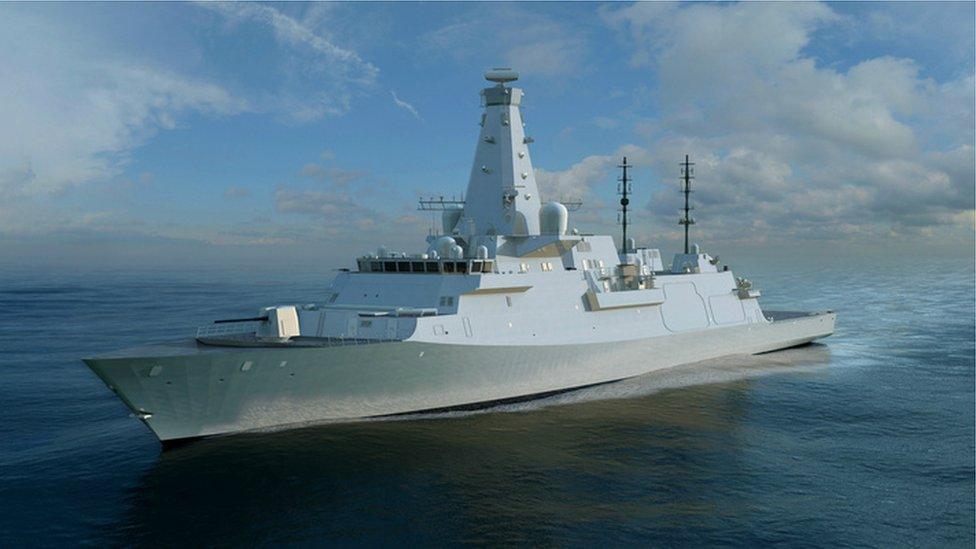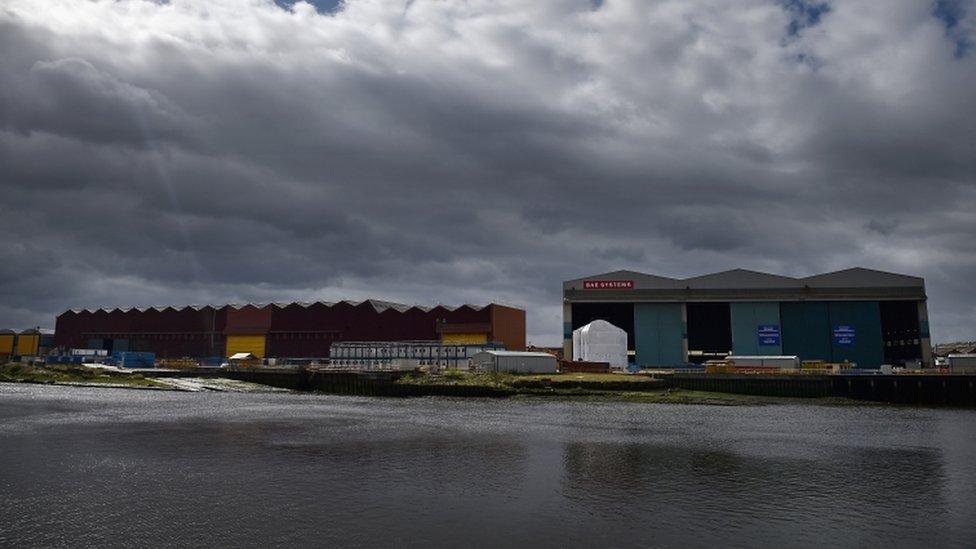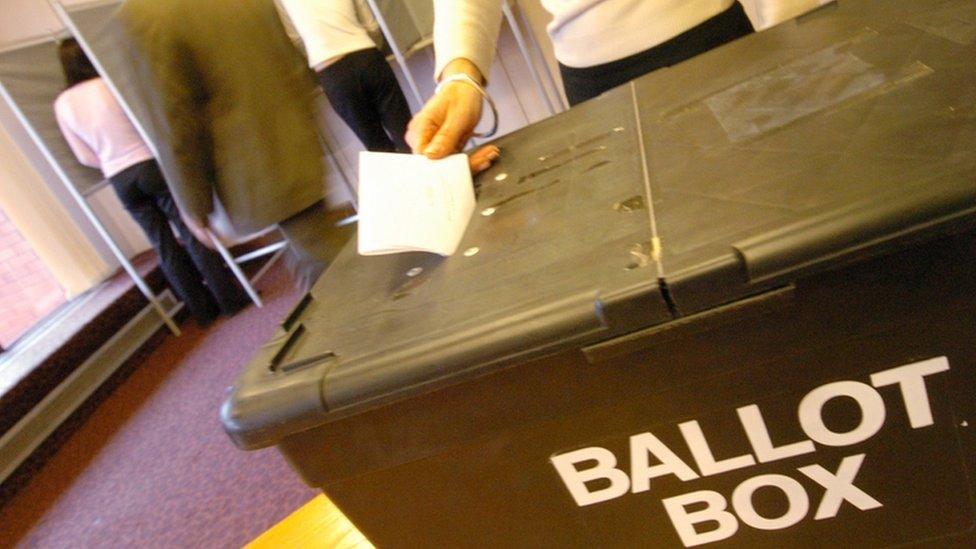Explainer: Concern over Clyde shipyard jobs
- Published
Union officials and politicians have called for assurances that jobs will not be lost at the BAE Systems shipyards on the Clyde despite the yards having an order to build eight new Royal Navy frigates.
But what has caused the concerns - and what has the UK government been saying to try to allay them?

What is the background to this?

Eight new Type-26 frigates are due to enter service with the Royal Navy in about a decade's time
David Cameron announced during the Strategic Defence Review last November that eight new Royal Navy Type-26 anti-submarine frigates would be built at the Clyde shipyards - which opponents said was five fewer than had been promised by the UK government ahead of the independence referendum.
Mr Cameron also said that "at least" five new general purpose Type-31 frigates would be built in Scotland in the future, "if the conditions are right".
The prime minister said: "The only way these ships wouldn't be built in Scotland is if Scotland was independent and didn't have the national resources of the Royal Navy."
Mr Cameron also announced that two smaller offshore patrol vessels would be built on the Clyde to tide the Govan and Scotstoun yards over until work on the new frigates began, which had been expected to happen later this year.
But the final contracts for the new frigates have not yet been signed by the Ministry of Defence and BAE Systems, which owns the Clyde yards.

So what are unions at the Clyde shipyards concerned about?
The unions don't seem to think that the Type-26 order is going to be cancelled by the Ministry of Defence - but they are concerned that construction of the new vessels will apparently not now begin until next year.
This seems to have come from briefings given to the unions by BAE Systems last week, following talks between the defence contractor and the MoD which saw the current demonstration phase for the new frigates being extended until June 2017.
Union officials have raised fears that any gap between the completion of the offshore patrol vessels and work beginning on the new frigates could lead to job losses, with some claiming between 800 and 1,000 posts could be at risk.
There has also been speculation that work on the new vessels could be carried out over a longer timeframe - meaning it would need fewer workers.
And unions on the Clyde are also concerned about the possible implications of a review of British shipyards currently being carried out for the Treasury by Sir John Parker, which they fear could lead to at least some of the work on the new frigates being contracted out to other yards elsewhere in the UK.
The Treasury wants to see competition for Royal Navy work to help drive down costs and to help Britain win export orders for naval ships - something it has not been doing well.

What promises are unions saying have been broken?

The Govan yard is one of a very few in the UK capable of building complex warships
When the Clyde yards won the battle with Portsmouth to become the shipyards for building Royal Navy complex warships more than two years ago it had to accept some job losses as the price for protecting most of the jobs, and that deal may not stick if the timetable slips for shipbuilding.
As already mentioned, there were originally to have been 13 of the Type-26 warships built, before that was cut to eight last November during the Strategic Defence Review.
And there was also a plan floated to build a "frigate factory", with £200m of investment in Scotstoun on the north side of the Clyde to ensure more efficient production, which could in turn have helped the Clyde become a centre for exporting, which it has failed to do for many years.
That plan did not come to fruition, and the intention now is to spend only half of that over the next two years, mainly on the Govan yard, to get it ready for the Type-26 contract.
However, the trade unions are concerned that they have not seen much of that investment so far.

What has the UK government been saying?
David Mundell, the Scottish secretary, told BBC Scotland on Monday morning that there was "no change" to the UK government's plans to build the eight new Type-26 frigates on the Clyde, but that it was up to BAE to deal with operational requirements.
It followed Scottish Conservative leader Ruth Davidson saying she had been told by UK Defence Secretary Michael Fallon that nothing had changed, and that the orders for all eight Type-26 frigates, five Type-31 frigates and two offshore patrol vessels would be "coming to the Clyde, as discussed last year, to the same timetable and the same number".
But politicians from other parties remain to be convinced, with both the SNP and Labour calling for clarity and warning against any "betrayal" of the shipyards, while the Scottish Liberal Democrats said the UK government should give an "absolute commitment" to the Clyde yards.
BAE Systems said it was working with the MoD to "agree a revised baseline for the Type-26 ships and a production schedule for the two additional offshore patrol vessels in Glasgow".

Is the timing of this a coincidence?

Voters will be going to the polls in both the Holyrood election and the EU referendum in coming weeks
There is almost certainly a political element at play here. The lead up to a Holyrood election seems like a good time to put pressure on the UK government to remind it - but also Labour and the Liberal Democrats - of the arguments that were made about the fate of the Clyde yards if Scotland became independent.
And it will not look good for the UK government to be attacked with words such as "betrayal" and "deception" so close to the EU referendum - particularly when it is in connection to promises made before another referendum.
So it won't do BAE any harm in its negotiations with the MoD to have unions raising these issues in public.
- Published25 April 2016

- Published23 April 2016

- Published22 April 2016
